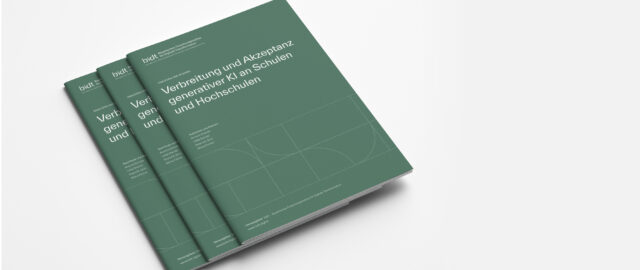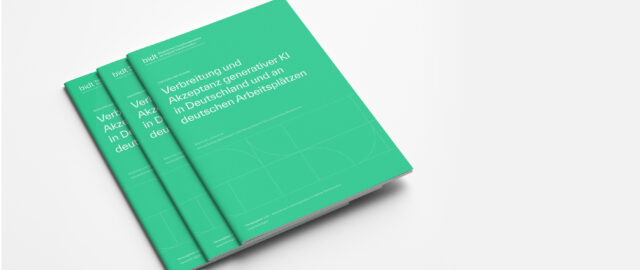Which competences are needed to ensure the digital participation of the EU population, especially regarding generative AI? Who is responsible for strengthening digital competence? Experts addressed these aspects at the event on 12 March 2024 at the Bavarian Representation in Brussels.
A panel discussion shed light on possible solutions to these key questions. The panel included Martin Ulbrich, Policy Officer DG Connect of the EU Commission, Dr Riina Vuorikari, member of the ALL DIGITAL Advisory Board, Professor Dr Alexander Pretschner, Chairman of the bidt Board of Directors and Dr Roland A. Stürz, Head of the bidt Think Tank. The panel was moderated by Katrin-Cécile Ziegler, Digital economist, lecturer & tech journalist.

Training critical thinking
The panellists agreed that digital competence is essential if Europe is to get fit for the future as part of the European Commission’s Digital Decade. They see critical judgement as another core skill that is indispensable, especially when it comes to generative AI.
You need to know how to prompt. You also need to know how to use the data. Critical aptitude is very important.
Dr. Riina Vuorikari, Advisoriy Board Member ALL DIGITAL
The ability to make judgements is extremely important. We have to understand what we are seeing. We need to use our minds. If it is true that we will experience a shift from creating to checking in all activities – and I firmly believe that we will – then we need to train the scrutinising, the critical thinking, more strongly.
Prof. Dr. Alexander Pretschner, Chairman of the bidt Board of Directors
Precisely because technologies are constantly changing, it is essential to strengthen critical judgement and digital competence across the population. This is the only way to reduce digital divides. “It’s important to include everyone,” emphasised Dr Roland A. Stürz, adding, “We know from studies that older people in particular are initially sceptical about digitalisation. If they see that they personally benefit from it, they are much more open to these technologies.” But how do we reach all people, including those who have less access to digital education or new technologies? “By finding out what people are interested in,” explains Martin Ulbrich, Policy Officer DG Connect of the EU Commission, adding: “That’s the beauty of generative AI: you can do anything with it and use it anywhere.”
Major impact of generative AI on democracy
Critical thinking is also required against the backdrop of the EU’s super election year. Because generative AI is a powerful tool that favours disinformation and thus influences political elections, AI and deepfakes also have a direct impact on coexistence in a democracy. Opinions differed as to how this challenge could be solved and in what timeframe.
Mastery of the latest developments in generative AI will become a key lever of Europe’s competitiveness and technological sovereignty. To achieve this mastery, a significant increase in advanced AI skills in the EU must be a priority, both regarding specialized generative AI developers and knowledgeable generative AI users. A sense of urgency is necessary, because the window of opportunity offered by the technological upheaval will not stay open forever.
Martin Ulbrich, Policy Officer DG Connect, European Commission
Korbinian Keck from the Representation of the Free State of Bavaria to the European Union also emphasised the opportunities of generative AI and in particular the benefits for the economy, society and administration in his welcoming address. In general, the influence of digital innovations on social coexistence is “an aspect that should not be neglected, especially in a super election year like 2024 with elections in the EU and the USA.”
The question of who bears the main responsibility for strengthening people’s digital competence was also discussed controversially. The individual himself was mentioned several times. Or is the state and its education systems responsible? The EU, the economy and companies or society as a whole? The opinions of the panellists differed in this regard and no consensus could be reached. In conclusion, Dr Riina Vuorikari argued that the entire digital ecosystem is needed, i.e. all of us.
Glossary
The “bidt-Digitalbarometer.international”: country comparison possible
A bidt study, which was presented in the run-up to the panel discussion, shows how well Europe is prepared for AI and how digital competence is distributed among the EU population. The “bidt-Digitalbarometer.international” was presented by Dr Roland A. Stürz, Head of the bidt think tank, and served as a factual basis. Thanks to the representative comparative study, empirical data is now available for the first time for the DigCompSAT self-assessment test, which compares the digital competence of the population in Germany, Austria, Finland, France, Italy, Spain and the UK. Using the self-assessment test (DigCompSAT), which is based on the European Digital Competence Reference Framework (DigComp), people aged 14 and over in the seven countries were asked about their digital competence. Additionally data were gathered about user behaviour, e-government, digitalisation of the work environment and perception of artificial intelligence (AI).
The “bidt Digitalbarometer.international” is incredibly valuable because it does not remain at a superficial level, but looks at the details, at people's self-assessment. And that is an important innovation.
Martin Ulbrich, Policy Officer DG Connect, European Commission
Digital divide particularly pronounced in Germany
The study shows where digital divides exist and which social groups are particularly affected by them. The digital divide is particularly wide in Germany: in no other country is digital competence so dependent on gender and age. In particular, the digital competence of older people, women and lower-income groups in Germany are in some cases significantly lower than those of comparable groups in other countries. In contrast, smaller countries such as Finland and Austria perform particularly well. Together with Spain and Italy, Germany brings up the rear. To ensure that Germany does not fall behind, the authors therefore call for the promotion of participation in society as a whole through standardised educational opportunities and greater support for further education.
People's digital competence play an important role for Germany as a business location, for our democracy and for participation in digital life. Data from the “bidt-Digitalbarometer.international” show that Germany has a particularly large digital competence divide compared to other European countries. We should not resign ourselves to this, but instead take measures to reduce this gap.
Dr. Roland A. Stürz, Head of bidt Think Tank
More information:
Image gallery





















© bidt/DPMN.be






